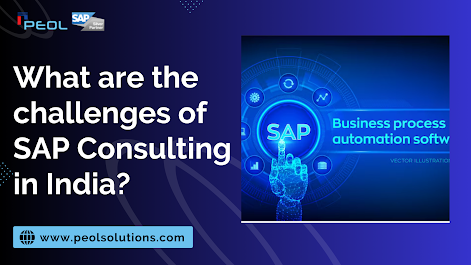What are the challenges of SAP Consulting in India?
Introduction:
SAP consulting in India presents a unique set of opportunities and challenges in the dynamic landscape of enterprise resource planning (ERP) solutions. As organizations across various industries increasingly adopt SAP technologies to drive digital transformation and increase operational efficiency, SAP consultants play a crucial role in implementing and optimizing these solutions. However, navigating the complexities and overcoming the challenges inherent in SAP consulting requires a strategic approach and a deep understanding of the Indian business environment. In this blog, we explore some of the key challenges faced by SAP consulting firms in India and strategies to address them effectively.
Rapid Technological Evolution:
One of the primary challenges in SAP consulting is keeping pace with the rapid technological evolution and the continuous updates and enhancements introduced by SAP. As SAP releases new modules, features, and functionalities, consultants must stay abreast of the latest developments and acquire the necessary skills and certifications to remain competitive in the market. Continuous learning and professional development initiatives are essential to ensure that consultants possess the expertise needed to deliver value-added solutions to clients.
Skilled Talent Acquisition:
Acquiring and retaining skilled SAP consultants poses a significant challenge for consulting firms in India. The demand for SAP professionals with expertise in various modules such as SAP S/4HANA, SAP SuccessFactors, SAP Hybris, and SAP Business Intelligence far exceeds the available talent pool. Moreover, attracting top talent often requires offering competitive compensation packages and providing opportunities for professional growth and advancement. To address this challenge, consulting firms must invest in talent acquisition strategies, including recruitment drives, campus placements, and partnerships with educational institutions to nurture future SAP professionals.
Complex Regulatory Environment:
Navigating the complex regulatory environment in India presents unique challenges for SAP consultants, particularly in industries such as banking, healthcare, and pharmaceuticals. Compliance with regulatory requirements, tax laws, and data privacy regulations adds layers of complexity to SAP implementations and customizations. Consultants must possess a deep understanding of local regulations and industry specific requirements to ensure that SAP solutions are aligned with legal and regulatory standards. Collaborating with legal experts and regulatory consultants can help mitigate compliance risks and ensure that SAP implementations adhere to statutory requirements.
Integration and Customization Complexity:
SAP implementations often involve integrating disparate systems, legacy applications, and third-party solutions to create seamless end-to-end processes. Integration and customization complexities arise due to differences in data formats, system architectures, and business processes across organizations. SAP consultants must possess strong analytical and problem-solving skills to design robust integration frameworks and develop custom solutions tailored to the unique needs of each client. Leveraging pre-configured templates, industry best practices, and agile methodologies can streamline the integration process and accelerate time-to-value for clients.
Change Management and User Adoption:
Successful SAP implementations extend beyond technical expertise to encompass change management and user adoption strategies. Resistance to change, lack of user training, and poor communication can delay the adoption of SAP solutions and undermine the success of implementation projects. SAP consultants must work closely with client stakeholders to identify potential barriers to adoption, develop comprehensive training programs, and facilitate organizational change initiatives. Engaging end-users early in the implementation process, requesting feedback, and addressing concerns proactively can promote a culture of collaboration and ownership, driving user acceptance and satisfaction.
Infrastructure and Resource Constraints:
Infrastructure limitations and resource constraints pose significant challenges for SAP consulting firms operating in India, particularly in remote and underserved regions. Poor internet connectivity, power outages, and infrastructure deficiencies can disrupt project timelines and delay remote collaboration with clients and team members. To mitigate these challenges, consulting firms must invest in modern infrastructure, cloud-based collaboration tools, and remote work capabilities to ensure uninterrupted project delivery. Establishing contingency plans, cross functional teams, and alternative communication channels can minimize the impact of infrastructure-related disruptions and boost project durability.
Conclusion:
SAP consulting in India presents countless challenges ranging from technological complexity and talent acquisition to regulatory compliance and change management. However, by adopting a strategic approach, investing in talent development, and using industry best practices, consulting firms can overcome these challenges and unlock opportunities for growth and innovation. Collaboration, continuous learning, and client-centricity are the cornerstones of successful SAP consulting engagements, enabling organizations to achieve their digital transformation objectives and drive sustainable business value in today's powerful business landscape.
For More Details:
Call: +91 8217898630
Mail: sales@peolsolutions.com
Visit: https://www.peolsolutions.com




Comments
Post a Comment